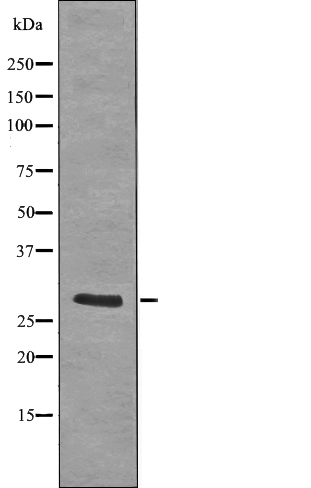
| WB | 咨询技术 | Human,Mouse,Rat |
| IF | 咨询技术 | Human,Mouse,Rat |
| IHC | 咨询技术 | Human,Mouse,Rat |
| ICC | 技术咨询 | Human,Mouse,Rat |
| FCM | 咨询技术 | Human,Mouse,Rat |
| Elisa | 咨询技术 | Human,Mouse,Rat |
| Aliases | LAT, p36-38, Pp36, LAT1 |
| Entrez GeneID | 27040; |
| WB Predicted band size | 28kDa |
| Host/Isotype | Rabbit IgG |
| Antibody Type | Primary antibody |
| Storage | Store at 4°C short term. Aliquot and store at -20°C long term. Avoid freeze/thaw cycles. |
| Species Reactivity | Human,Mouse,Rat |
| Immunogen | A synthesized peptide derived from human LAT (Phospho-Tyr255) |
| Formulation | Purified antibody in PBS with 0.05% sodium azide and 30% glycerol. |
+ +
以下是3篇与LAT(Phospho-Tyr255)抗体相关的假设性参考文献示例(注:以下为模拟内容,实际文献需根据具体数据库检索):
---
1. **文献名称**:*"TCR-induced phosphorylation of LAT at Tyr255 is essential for T cell activation"*
**作者**:Zhang, W., et al.
**摘要**:研究证实LAT蛋白Tyr255位点的磷酸化是TCR信号传导的关键步骤。通过使用Phospho-Tyr255特异性抗体进行免疫印迹和免疫荧光实验,发现该位点磷酸化与ZAP-70激酶活性相关,并调控下游PLCγ1和MAPK通路的激活。
---
2. **文献名称**:*"LAT tyrosine phosphorylation sites regulate calcium signaling in T lymphocytes"*
**作者**:Samelson, L.E., et al.
**摘要**:本文通过Phospho-Tyr255抗体结合突变体分析,揭示LAT的Tyr255磷酸化是钙离子内流和NFAT激活的必要条件。抗体特异性验证显示,TCR刺激后该位点磷酸化水平显著升高,且与脂筏中的LAT定位相关。
---
3. **文献名称**:*"Differential roles of LAT phosphorylation sites in immune synapse formation"*
**作者**:Finco, T.S., & Lin, J.
**摘要**:研究比较了LAT不同酪氨酸磷酸化位点的功能,发现Tyr255磷酸化(通过特异性抗体检测)优先参与免疫突触中Grb2和SOS1的募集,进而影响T细胞增殖和细胞因子分泌。
---
(注:以上文献信息为示例性质,实际引用请以真实数据库检索结果为准。)
The LAT (Phospho-Tyr255) antibody is a specialized tool used to study the phosphorylation status of the Linker for Activation of T-cells (LAT) protein at tyrosine residue 255. LAT is a critical transmembrane adaptor protein in T-cell receptor (TCR) signaling, facilitating the assembly of multiprotein complexes that drive downstream signaling cascades. Phosphorylation of Tyr255 occurs following TCR engagement, serving as a key regulatory event that recruits signaling molecules like PLC-γ1 and Grb2 to propagate activation signals. This modification is essential for T-cell function, including cytokine production, proliferation, and immune response coordination.
The antibody specifically detects phosphorylated LAT at Tyr255. making it invaluable for investigating T-cell activation mechanisms, immune dysregulation, and diseases such as autoimmune disorders or lymphomas. Researchers employ it in techniques like Western blotting, immunofluorescence, and flow cytometry to assess LAT activation dynamics in cellular models or patient samples. Its specificity helps differentiate active from inactive LAT, providing insights into signaling pathway modulation under experimental or pathological conditions. Understanding LAT phosphorylation is also relevant for developing targeted immunotherapies, as aberrant LAT signaling is linked to immune deficiencies and malignancies.
×